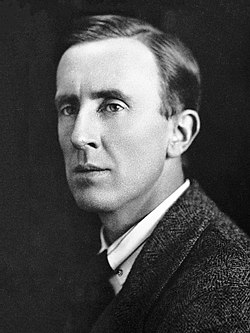J.R.R. Tolkien Quote
Then as he had kept watch Sam had noticed that at times a light seemed to be shining faintly within; but now the light was even clearer and stronger. Frodo's face was peaceful, the marks of fear and care had left it; but it looked old, old and beautiful, as if the chiseling of the shaping years was now revealed in many fine lines that had before been hidden, though the identity of the face was not changed. Not that Sam Gamgee put it that way to himself. He shook his head, as if finding words useless, and murmured: I love him. He's like that, and sometimes it shines through, somehow. But I love him, whether or no.
J.R.R. Tolkien
Then as he had kept watch Sam had noticed that at times a light seemed to be shining faintly within; but now the light was even clearer and stronger. Frodo's face was peaceful, the marks of fear and care had left it; but it looked old, old and beautiful, as if the chiseling of the shaping years was now revealed in many fine lines that had before been hidden, though the identity of the face was not changed. Not that Sam Gamgee put it that way to himself. He shook his head, as if finding words useless, and murmured: I love him. He's like that, and sometimes it shines through, somehow. But I love him, whether or no.
Related Quotes
Hobbits always so polite, yes! O nice hobbits! Smeagol brings them up secret ways that nobody else could find. Tired he is, thirsty he is, yes thirsty; and he guides them and he searches for paths, an...
J.R.R. Tolkien
Tags:
frodo baggins, gollum, hobbit, lord of the rings, name, path, rest, samwise gamgee, sleep, smeagol
About J.R.R. Tolkien
John Ronald Reuel Tolkien (, 3 January 1892 – 2 September 1973) was an English writer and philologist. He was the author of the high fantasy works The Hobbit and The Lord of the Rings.
From 1925 to 1945 Tolkien was the Rawlinson and Bosworth Professor of Anglo-Saxon and a Fellow of Pembroke College, both at the University of Oxford. He then moved within the same university to become the Merton Professor of English Language and Literature and Fellow of Merton College, and held these positions from 1945 until his retirement in 1959. Tolkien was a close friend of C. S. Lewis, a co-member of the informal literary discussion group the Inklings. He was appointed a Commander of the Order of the British Empire by Queen Elizabeth II on 28 March 1972.
After Tolkien's death his son Christopher published a series of works based on his father's extensive notes and unpublished manuscripts, including The Silmarillion. These, together with The Hobbit and The Lord of the Rings, form a connected body of tales, poems, fictional histories, invented languages, and literary essays about a fantasy world called Arda and, within it, Middle-earth. Between 1951 and 1955 Tolkien applied the term legendarium to the larger part of these writings.
While many other authors had published works of fantasy before Tolkien, the tremendous success of The Hobbit and The Lord of the Rings ignited a profound interest in the fantasy genre and ultimately precipitated an avalanche of new fantasy books and authors. As a result he has been popularly identified as the "father" of modern fantasy literature and is widely regarded as one of the most influential authors of all time.
From 1925 to 1945 Tolkien was the Rawlinson and Bosworth Professor of Anglo-Saxon and a Fellow of Pembroke College, both at the University of Oxford. He then moved within the same university to become the Merton Professor of English Language and Literature and Fellow of Merton College, and held these positions from 1945 until his retirement in 1959. Tolkien was a close friend of C. S. Lewis, a co-member of the informal literary discussion group the Inklings. He was appointed a Commander of the Order of the British Empire by Queen Elizabeth II on 28 March 1972.
After Tolkien's death his son Christopher published a series of works based on his father's extensive notes and unpublished manuscripts, including The Silmarillion. These, together with The Hobbit and The Lord of the Rings, form a connected body of tales, poems, fictional histories, invented languages, and literary essays about a fantasy world called Arda and, within it, Middle-earth. Between 1951 and 1955 Tolkien applied the term legendarium to the larger part of these writings.
While many other authors had published works of fantasy before Tolkien, the tremendous success of The Hobbit and The Lord of the Rings ignited a profound interest in the fantasy genre and ultimately precipitated an avalanche of new fantasy books and authors. As a result he has been popularly identified as the "father" of modern fantasy literature and is widely regarded as one of the most influential authors of all time.
